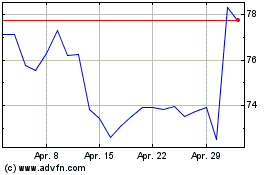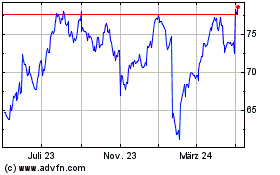(FROM THE WALL STREET JOURNAL 1/6/16)
By Bob Tita and Joann S. Lublin
To gauge the future of the planned chemical titan DowDuPont, it
helps to look back at the dismantling of another industrial giant:
Tyco International PLC.
DuPont Co. Chief Executive Edward Breen spent a decade as CEO of
Tyco, pulling apart what was once among the largest U.S.
conglomerates. He transformed Tyco from a company with $41 billion
a year in revenue to one that now has about $10 billion in annual
sales, mostly from security and fire-suppression systems for
commercial buildings.
Mr. Breen and Dow Chemical Co. CEO Andrew Liveris plan to
similarly disassemble their two companies after first merging them
into one with about $90 billion a year in combined sales. Mr. Breen
will be the CEO of the resulting enterprise, DowDuPont, which the
companies hope regulators will approveby the end of 2016.
Executives plan to eliminate about $3 billion in annual costs,
then split DowDuPont by 2018 into separate companies focused on
agriculture,industrial materials and specialty products.
Mr. Liveris, who will be chairman of the combined company,
brings some experience in separating businesses as well. Dow last
year split off much of its chlorine business in a $5 billion deal
with smaller rival Olin Corp. Dow also has committed to reducing
costs without sacrificing growth.
"You always have productivity as your focus," Mr. Liveris said
in an interview, adding that the company has figured out how to
stay lean while it grows.
Mr. Breen, in an interview, said his Tyco experience offers a
guide to how to select and prepare executives for the changes.
Several people who know him agreed that his Tyco work showed an
ability to assess how executives and business units can slide
effectively into new companies.
"He likes stepping into situations that have a lot of moving
parts," said Deane Dray, a longtime analyst covering industrial
conglomerates at RBC Capital Markets. "It's easier for CEOs to be
acquisitive and empire builders than to be diplomatic and ruthless
about making decisions to create viable spin outs. He's not shy
about controversy."
During Mr. Breen's tenure as Tyco's CEO, which ended in 2012,
the company sold about 100 businesses, hived off three public
spinoffs, and made Tyco shareholders majority owners of a fourth
through a merger.
Some of the resulting stocks became hits, particularly
medical-equipment company CovidienPLC. Othershave faredless well,
particularly home-security service ADT Corp.
Unlike DuPont or Dow, Tyco was in perilous financial shape when
Mr. Breen arrived in 2002 after serving as president of Motorola
Inc.
Following years of acquisitions by his predecessor, L. Dennis
Kozlowski, Tyco was saddled with debt and dozens of incompatible
businesses that made it unwieldy to manage.
Still, fellow directors were surprised when Mr. Breen in late
2005 proposed spinning off Tyco's medical products and electronics
businesses, recalled a former Tyco executive.
The medical business, which would become Covidien, was Tyco's
most profitable unit. Tyco Electronics, a components manufacturer
that became TE Connectivity Ltd., generated the most revenue.
Mr. Breen argued at the time that separation would help the
businesses thrive. For example, Covidien, which manufactured
pharmaceuticals, sutures, surgical instruments, and other items for
operating rooms, needed independence to invest in research and
development, and to attract specialized employees wary of joining a
manufacturing conglomerate.
The spinoffs began trading in 2007. Covidien's stock price
soared more than 170% through early 2015, when it was acquired by
medical-device maker Medtronic Inc.for $42.9 billion in cash and
stock.
Thomas Lynch, TE Connectivity's CEO since its split, credits Mr.
Breen with identifying executives and board members for the new
companies early on and involving them in decisions.
Mr. Breen created trust among the future CEOs, and avoided
surprises. "It was very seamless when the split occurred," Mr.
Lynch said.
Connectivity's stock languished following the move, owing partly
to the auto industry's collapse, but is up 71% since the start of
2013.
Four years after the initial spinoff, Tyco said it planned to
split off ADT security and its business selling valves and
pipes.
To groom executives to run them, Mr. Breen devised a six-month
training program, emphasizing compliance with regulatory
requirements and managing relations with investors and board
members, recalled Laurie Siegel, Tyco's then senior vice president
of human resources. "We even went into things like how to do
succession planning with a board,"shesaid.
Mr. Breen says he tried to be clear with employees about their
aspirations and prospects, and stepped back while senior managers
handled portions of earnings calls to explain plans for their
proposed new units. "People were nervous," Mr. Breen said in the
interview, but "that process worked very well for us."
Tycoended up merging the pipes-and-valves business with Pentair
Ltd.in 2012, giving Tyco shareholders 52.5% of the resulting
company. Pentair's stock rose in the two years after the merger,
but fell in 2015 amid weaker sales, particularly in energy, leaving
it up 15% since the merger.
ADT has an industry-leading 25% share of the home security
market in the U.S. and Canada, but has faltered since its 2012
spinoff, owing partly to high costs to acquire customers and new
competition from cable TV and phone service providers. Its shares
are down 13% since their debut.
ADT recently entered the commercial-building security market,
competing with Tyco, its former parent. ADT declined to
comment.
Tyco performed well immediately after the last breakup, its
stock beating the broader market during its first two years of
trading. But its shares fell 27% in 2015 amid slowing revenue
growth. Its 2016 sales and profit guidance lagged behind analysts'
expectations.
Despite more challenging business conditions, corporate breakups
such as Tyco's that create focused companies remain popular with
investors.
Jack Krol, a retired DuPont CEO who was Tyco's lead independent
director during much of the Breen era, expects Mr. Breen to follow
the same breakup playbook at DowDuPont.
"He will send [the companies] out with strong balance sheets and
the right kind of people to run them," Mr. Krol said. In that way,
"they don't run into trouble."
---
Jacob Bunge and Rachel Feintzeig contributed to this
article.
(END) Dow Jones Newswires
January 06, 2016 02:47 ET (07:47 GMT)
Copyright (c) 2016 Dow Jones & Company, Inc.
DuPont de Nemours (NYSE:DD)
Historical Stock Chart
Von Jun 2024 bis Jul 2024

DuPont de Nemours (NYSE:DD)
Historical Stock Chart
Von Jul 2023 bis Jul 2024
